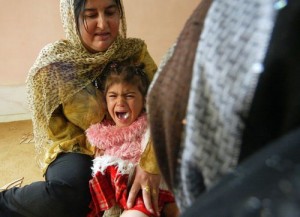
(AFP File Photo)
The Egyptian Ministry of Health has launched a Medical Protocol for Management of Victims of Gender Based Violence. The protocol was prepared in cooperation with the United Nations Population Fund (UNFPA) and the Regional Center for Training in Family Planning and Reproductive Health (RCT).
The protocol will be applied in Greater Cairo, Assiut and Sohag by the end 2014, said UNFPA representative Jaime Nadal. All Egyptian cities will follow in 2015.
Violence against women is the most common violation of human rights, he said. One in three women around the world has reported an experience of violence, 38% of all murder crimes against women were by their partners.
“The Egyptian constitution granted women many rights,” said Mervat Tallawy, chairwoman of the National Council of Women, “yet these rights will remain just words on paper if we don’t apply them correctly.”
Society and culture, in which violence against women, including sexual assault, coercion and female genital mutilation (FGM) is rooted, needs to be changed to give women their rights, she said.
The first doctor sent to trial in Egypt on FGM, was acquitted last week. The doctor, who was sent to trial in 2013, was charged in the death of a 13 year-old girl during a FGM procedure. He went to trial alongside the victim’s father.
The “poor family” retracted their initial accusations after being offered money, Tallawy said.
At least 91% of Egyptian women between the age of 15 and 49 have undergone FGM, according to a report by the United Nations.
“We keep saying that we need to save our customs and traditions,” she said, “what if some of them are wrong?”
In addition to legal procedures to support victims of gender based violence, such as finding proof for forensic reports, the protocol discusses medical and psychological aspects of the problem.
Topics include finding shelter to women who cannot live with their partners after experiences of violence, as well as cultural barriers that could hinder solving the problem. This could include victims’ refusal to report their partners and “male-dominant” culture of some medical practitioners.
Medical practitioners play an important role not just in responding to gender based violence, but in preventing it, said Nadal. Prevention of FGM procedures and reporting any case that suffers from complications of gender based violence can help control the problem.
“How would we compete internationally if half our manpower experiences violence?” said Tallawy, “It’s like walking on one leg.”



